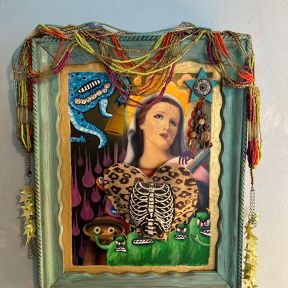
Highly Sensitive Person
Highly Sensitive Person, or HSP, is a term coined by psychologist Elaine Aron. According to Aron’s theory, HSPs are a subset of the population who are high in a personality trait known as sensory-processing sensitivity, or SPS. Those with high levels of SPS display increased emotional sensitivity, stronger reactivity to both external and internal stimuli—pain, hunger, light, and noise—and a complex inner life.

The concept of high-sensitivity has gained traction in the years since Aron conceived of it, particularly as more and more people began to self-identify as highly sensitive. Overall, about 15 to 20 percent of the population are thought to be highly sensitive.
HSPs are thought to be more disturbed than others by violence, tension, or feelings of being overwhelmed. They may, as a result, make concerted efforts to avoid situations in which such things are likely to occur. On the more positive end of the trait, high sensitivity is thought to be linked to higher levels of creativity, richer personal relationships, and a greater appreciation for beauty.
If you react strongly to criticism, become physically and emotionally overstimulated more easily than others do, and have a rich inner life, you may score highly in sensory processing sensitivity. You may also feel as if you have a higher capacity for empathy and are quite sensitive to others’ moods.
Children who cry easily, become overstimulated quickly, or who are highly distressed when others are in pain may have high sensory processing sensitivity, likely due to a mix of genetic and environmental factors. While such children can present challenges for caregivers, they are able to flourish in supportive environments.
The test to measure sensory sensitivity in the adult population is known as the Highly Sensitive Person Scale (HSPS). It was first developed and validated by Aron and her husband, Art Aron, in the 1990s, and is available on their website.
According to Aron’s conception of high sensitivity, it isn’t a mental health disorder; rather, it is defined, like other aspects of personality, as a trait that exists in each person to varying degrees. Despite some drawbacks associated with high sensitivity, evidence suggests it may also offer adaptive advantages.
High sensitivity is thought to have genetic roots, and some specific gene variants have been associated with the trait. But early childhood environments may play a role as well; evidence suggests that early experiences may have an epigenetic effect on the genes associated with sensitivity.

Being a highly sensitive person can come with many challenges. HSPs may struggle to adapt to new circumstances, may demonstrate seemingly inappropriate emotional responses in social situations, and may easily become uncomfortable in response to light, sound, or certain physical sensations. On the other hand, HSPs often report that they form deep bonds with others, have exciting dreams and internal monologues, and find great enjoyment in art, music, and human connection.
Like all personality traits, there are pros and cons to being highly sensitive. With proper support and a recognition of one’s own strengths and weaknesses, HSPs can set up environments in which they can thrive.
There is no specific treatment recommended for high sensitivity, as it is conceptualized as a personality trait rather than a disorder. However, since the trait often comes with emotional or interpersonal challenges—and may co-occur with anxiety and depression—HSPs may find talk therapy useful for their overall well-being.
Self-care is critical for HSPs, particularly when faced with stressful situations. Getting enough sleep, eating a healthy diet, limiting caffeine and alcohol, and planning for decompression time can all be useful strategies. Talking to a friend or therapist can also help an HSP cope with heightened emotional responses to stress.
If someone you know is highly sensitive, it’s first critical to accept that it is part of their temperament and likely can’t be changed. Giving the person space to decompress, encouraging self-care, and looking for the strengths inherent in their sensitivity can help the relationship—and the individual—thrive.
HSPs feel as if they register more details of their environment than less sensitive people do—including sounds, sights, or emotional cues. Though such stimuli can feel overwhelming, modifying the environment to suit their needs can be empowering. Most HSPs argue that, despite their sensitivity, they are still capable of overcoming challenges.

Though highly sensitive people have been likened to introverts or those high in neuroticism, Aron’s theory maintains that the traits are distinct from one another. Much like introversion and neuroticism, however, in the eyes of those who identify with the trait, high sensitivity can bring many challenges.
While some comparisons can be drawn between Aron’s HSP theory and a condition known as sensory processing disorder, she and her collaborators do not believe that highly sensitive people have SPD. Similarly, high sensitivity may show up more frequently in those with autism or ADHD, but is distinct from those conditions.
High sensitivity is not synonymous with introversion, but many HSPs (approximately 70 percent, according to Aron) identify as introverts. Introversion refers to a personality trait in which someone “recharges” by being alone; high sensitivity encompasses emotional, physical, and sensory sensitivity.
Yes. In fact, though high sensitivity more often overlaps with introversion, Aron argues that as many as 30 percent of HSPs are actually extroverted—though they may still be perceived by others as shy.
Some who study empathy argue that though the traits are not mutually exclusive, highly sensitive people are distinct from so-called “empaths,” who easily read and absorb the moods of others. Aron, however, has distanced the HSP label from those who believe “empaths” have psychic or otherworldly abilities.
Sensory processing disorder is a condition in which the body and brain do not respond appropriately to sensory input. It is distinct from sensory processing sensitivity because while an HSP may have a stronger reaction to sensory input, their brain and body will still process and respond to the stimuli correctly.














